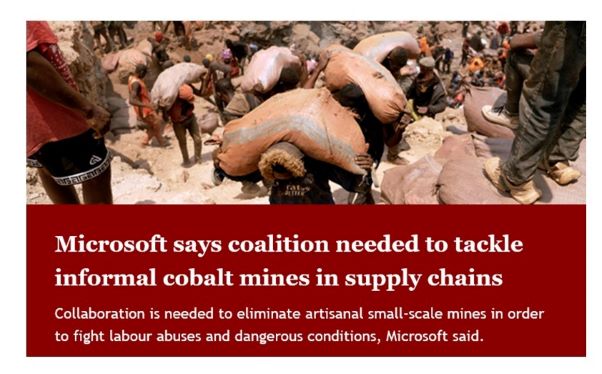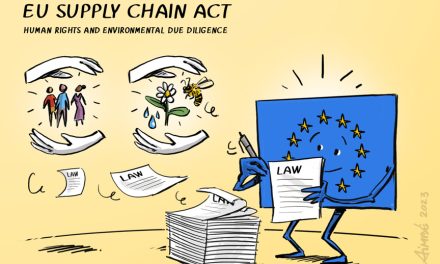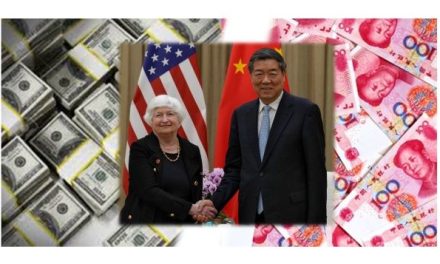Microsoft has called for an industry coalition on ethical cobalt sourcing after the company’s corporate responsibility boss visited unofficial mines in the Democratic Republic of Congo (DRC).
 Michele Burlington, chief of staff for technical and corporate responsibility at Microsoft, joined professor Dorothee Baumann-Pauly from The Geneva Center for Business and Human Rights on a fact-finding trip to the country in December 2022.
Michele Burlington, chief of staff for technical and corporate responsibility at Microsoft, joined professor Dorothee Baumann-Pauly from The Geneva Center for Business and Human Rights on a fact-finding trip to the country in December 2022.
Three-quarters of the world’s cobalt comes from the DRC, and a third of the country’s production comes from unofficial, artisanal small-scale mines (ASMs), which are associated with labour abuses and dangerous conditions.
 Baumann-Pauly said rather than turning a blind eye to ASMs, brands should “formalise” them and integrate them into supply chains to improve conditions. She told Supply Management: “I think the motivation for Microsoft was to get a clearer understanding of the situation on the ground, of what was possible with formalisation. “Microsoft is a step ahead in that they acknowledge there are problems, they’re not defining them away, they’re acknowledging that cobalt supply chains might be intertwined with these ASMs.”
Baumann-Pauly said rather than turning a blind eye to ASMs, brands should “formalise” them and integrate them into supply chains to improve conditions. She told Supply Management: “I think the motivation for Microsoft was to get a clearer understanding of the situation on the ground, of what was possible with formalisation. “Microsoft is a step ahead in that they acknowledge there are problems, they’re not defining them away, they’re acknowledging that cobalt supply chains might be intertwined with these ASMs.”
Baumann-Pauly produced a report on her findings from the trip to Mutoshi ASM, prompted because it was the site of a formalisation scheme by commodity trader Trafigura that gave informal miners access to tools and a mechanically-prepared mining site with safety standards. The scheme began in 2018 but was halted due to Covid in 2020, and Baumann-Pauly wanted to discern its impact. She said miners’ lives were “significantly better under formalisation”. She said Microsoft was “hoping for a coalition of companies to come together and take on that challenge jointly, because that’s the next step”.
A Microsoft spokesperson told SM: “Microsoft is committed to responsible and ethical sourcing, a responsibility we take very seriously. We are continuing to work on this problem. It’s an issue that will take a coalition to solve.”
Baumann-Pauly explained downstream companies were currently focusing on track and tracing technologies in an attempt to seal off their supply chains from being implicated with labour abuses in ASMs. However, as most cobalt is refined in China, anyone sourcing from there would inevitably be implicated in abuses.
“The human rights problems affiliated with these supply chains are being overlooked,” Baumann-Pauly said. “We all want to accelerate the transition away from fossil fuels. But all the other supply chains come with other complications that we shouldn’t forget about either. Just putting a rule in a contract doesn’t solve any problems on the ground.
“The question is, how do we integrate them in global supply chains in a way that offers decent jobs? Formalisation is an approach to doing that. Companies need to come to the table and agree on what standards they want to see in formalisation. We observed two key success factors: highlighting the role of women and the extraction method of open pits.
“Thousands of artisanal miners work on industrial sites anyway. Companies are turning a blind eye to this. A protected space where rules apply, or personal protective equipment is supplied, where there are open pits, and women can work there too. This would be a very concrete way to advance responsible sourcing. And the Mutoshi site shows it’s been done before. If those standards are met at a site, companies must commit to sourcing from it.”
Baumann-Pauly also emphasised the importance of governments in promoting ethical cobalt mining. She suggested a body such as the EU invite car manufacturers and electronic companies to begin discussion over standards, KPIs for  formalised sites, and commitments to collaboration between cobalt purchasers.
formalised sites, and commitments to collaboration between cobalt purchasers.
This article was published recently posted by Will Phillips in Ethics, Procurement, Risk
Source: Supply Chain Management
Also read:
Tech Supply Chains Demonstrate ‘Abject Failure’ on Forced Labour Due Diligence
What Germany’s Supply Chain Law Means for Procurement Published on January 14, 2023
EU Supply Chain Law Obliges Companies to Operate in a Fair and Sustainable Manner: Published on January 13, 2023
The Understatement of the Year: The German Supply Chain Law to have Global Ramifications: Published on January 11, 2023
Practically Every Major Car Part Linked to Forced Labour’: Published on December 22, 2022
Canada Becomes Latest Country to Develop Supply Chain Due Diligence Law: Published on December 21, 2022
What is in a Name? Lieferantenkettensorgfaltspflichtengesetz: Published on November 01, 2022
![]() Editorial Comment: We congratulate Michele Burlington, chief of staff for technical and corporate responsibility at Microsoft and Dorothee Baumann-Pauly from The Geneva Center for Business and Human Rights to undertake this trip and to produce this research. Legislations in buyers home counties alone will not solve the problem. It takes a cooperative approach to set standards, provide workable solutions and above all for the countries involved to create the necessary conditions to eliminate abusive practices, enforce compliance at the location and to provide transparency.
Editorial Comment: We congratulate Michele Burlington, chief of staff for technical and corporate responsibility at Microsoft and Dorothee Baumann-Pauly from The Geneva Center for Business and Human Rights to undertake this trip and to produce this research. Legislations in buyers home counties alone will not solve the problem. It takes a cooperative approach to set standards, provide workable solutions and above all for the countries involved to create the necessary conditions to eliminate abusive practices, enforce compliance at the location and to provide transparency.


























